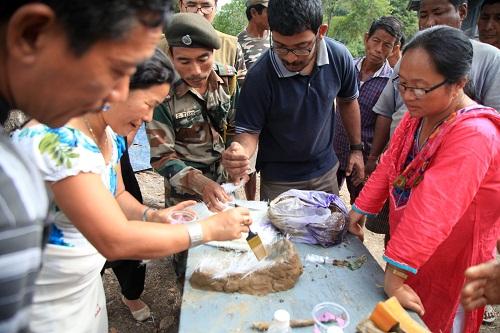To contain wildlife hunting by the tribal communities of Arunachal Pradesh, Wildlife Trust of India (WTI) carried out an intensive training programme on alternative wildlife products at Pakke Tiger Reserve in Seijosa, Arunachal Pradesh. In partnership with the Department of Environment and Forests, Government of Arunachal Pradesh, the training aims to develop conservation entrepreneurship amongst the tribal communities for a safer future of the wildlife in the state.
More than 25 participants, including 17 women from Seppa SHG, from East Kameng district, took part in the alternative wildlife product training in two phases at Pakke, which was completed last week.
In 2004, WTI in collaboration with the state Forest Department introduced artificial hornbill beaks, for the conservation of Hornbill. Over the years, it has had an immense acceptance in the community. This response encouraged WTI to organise artificial beak-making training for the local community.
Use of wildlife parts for head gear and Dao (long bladed knife) is a traditional practice among the tribal communities of the state. Tribals hunt wild animals or birds for their fur or beak which is an integral part of their traditional attire which in turn is having an adverse impact on the ecological balance.
According to Tana Tapi, DFO, Pakke Tiger Reserve, “If we can encourage the communities with these alternative wildlife products, it will bring down the killings and people will earn a handsome livelihood too. It is high time to save the wildlife in Arunachal Pradesh and I am hopeful that the trainees will be able to create a market for such products.
The wildlife in Arunachal Pradesh is affected by threats induced by both anthropogenic and natural factors. Apart from human-animal conflict, habitat loss, and natural calamities like floods and landslides, local tribes as per tradition also hunt the wildlife for their skin, meat and beaks. Though most of the tribal hunting rituals are for sustenance and not for trade, they do take a toll on the wildlife of the state.
During the course of the training, the women from Seppa, East Kameng, displayed keen interest in the programme. Macha Dada, who was part of the training, said, “It will help us to develop a new business and at the same time wildlife will be saved.” The participants claimed that the alternatives are much cheaper than the original wildlife decorative products. "So if we can produce quality products after the training, it will definitely mobilise buyers," Macha Dada added.
Tamo Dada, Wildlife Biologist and Administrative Officer, Government of Arunachal Pradesh, said, “With this skill training, we can spread the message of conservation and that will also help in the safeguarding the wildlife in our state.”
“We are promoting conservation entrepreneurship in Arunachal Pradesh for the safety of wildlife and the biodiversity. By providing alternative wildlife products, we are trying to develop a viable alternative to create an impact in the long run to conserve wildlife. This is an attempt to build a harmonious space between culture and wildlife,” said Sunil Kyarong, Regional Head – Arunachal Pradesh, WTI.
Professionals were roped in to train the participants in the skill of making artificial hornbill beak and other alternatives to wildlife products with an objective to create awareness and alternative livelihood support. This initiative was supported by a Rapid Action Project (RAP) of WTI. Radhika Bhagat, Head, Wild Aid, WTI, emphasised, “We need to look at such innovative solutions to preserve traditional customs and beliefs of the tribal communities."







Add new comment